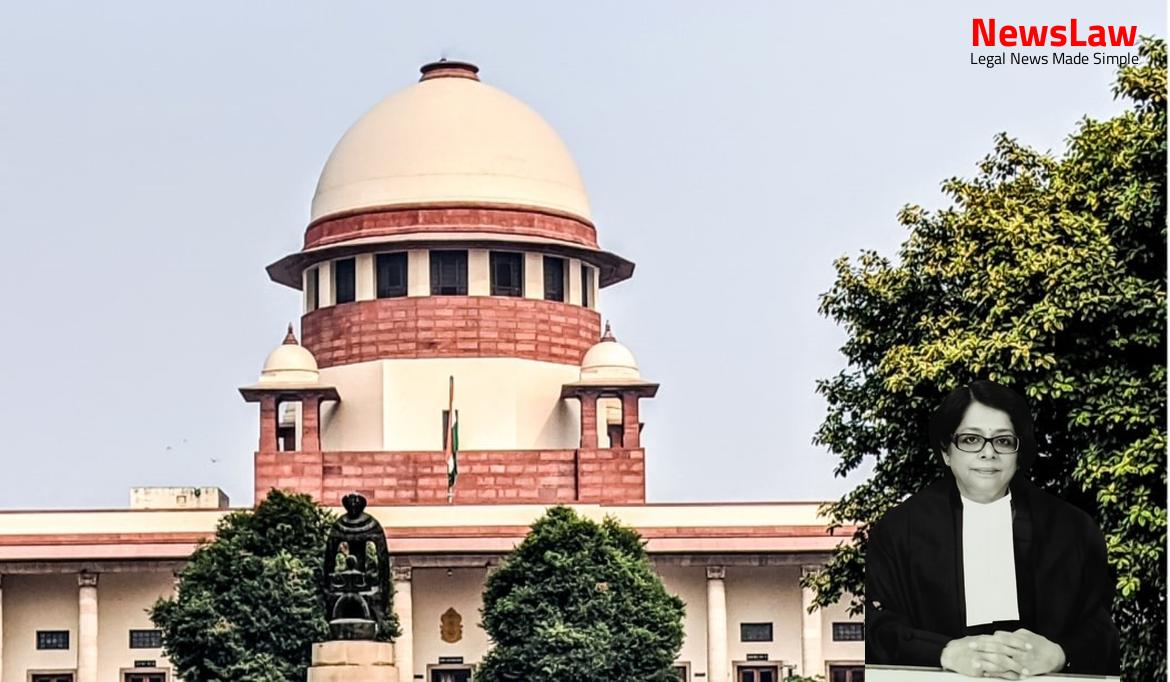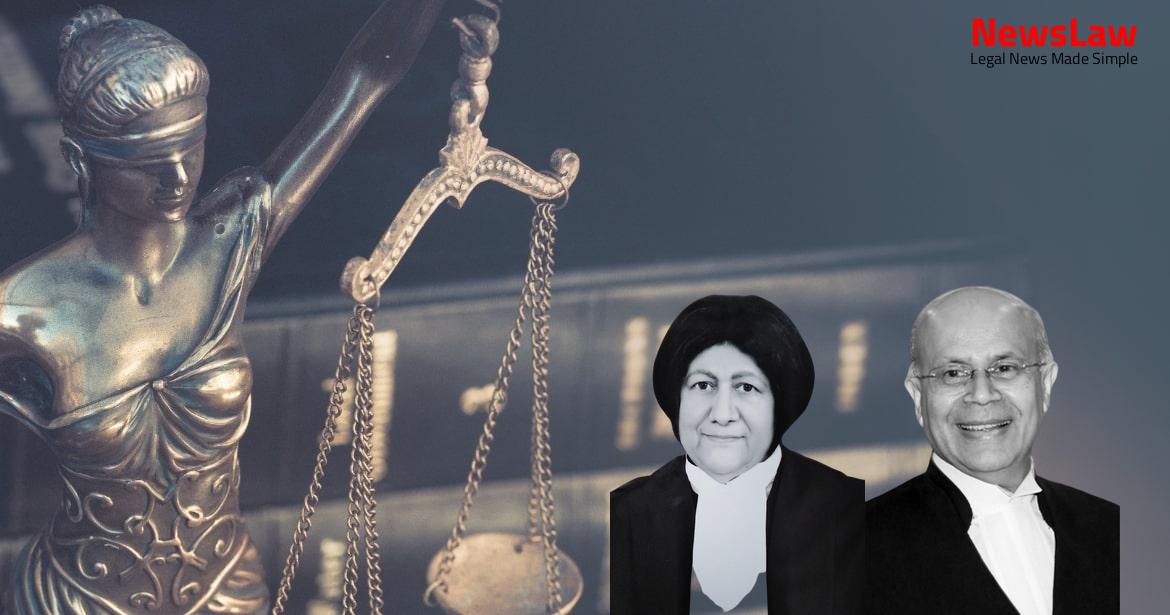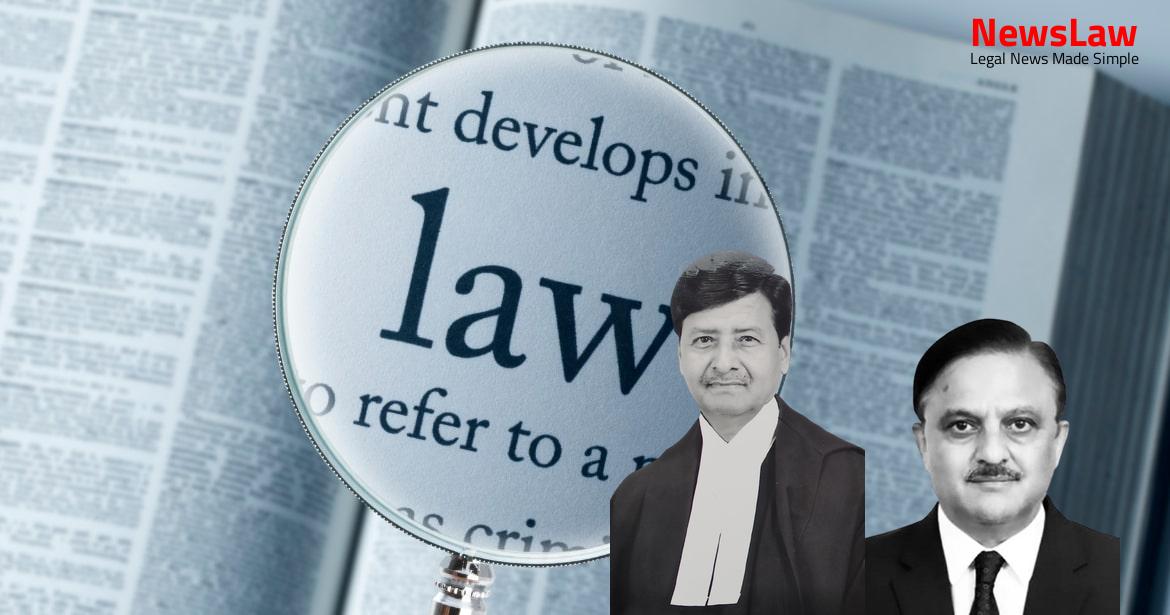Explore the in-depth legal analysis conducted by the court in a recent case regarding maintenance laws and enforcement procedures. The court’s examination of overlapping jurisdiction, criteria for determining maintenance amounts, and options for enforcing maintenance orders provides clarity on complex family law issues. This summary focuses on the court’s insightful analysis to ensure fair outcomes and timely support for the dependents involved.
Facts
- The mediation between the parties failed on 08.10.2020.
- The wife left the matrimonial home in January 2013 after the birth of their son.
- Allegations were made that the husband retained the wife’s Streedhan and refused to return it.
- Orders passed by the Court and under the D.V. Act were not being complied with by the husband.
- Both parties presented arguments and submitted written statements.
- The husband was directed to pay Rs.1,45,000 to the wife by a specific deadline.
- The wife was granted interim maintenance of varying amounts under different orders.
- The husband claimed financial inability to comply with the maintenance orders.
- The husband was directed to provide his income tax returns and passport details.
- There were delays in disposing of interim maintenance applications as per statutory time frames.
- A trust deficit existed between the parties, making reconciliation unlikely.
- The husband acknowledged arrears of maintenance due to the wife.
- The wife highlighted the inadequacy of maintenance awarded for their growing son.
- The husband expressed challenges in paying maintenance to the wife due to alleged lack of income.
- The husband indicated compliance with maintenance payments for the son but raised issues regarding academic fees.
- The husband petitioned against the Family Court’s order in the High Court.
- The High Court dismissed the Writ Petition on 14.08.2018, affirming the Family Court’s Judgment.
- The Appellant-husband was given a final opportunity to make payment of the balance amount by 30.11.2019.
- Failure to make the payment would result in proceedings under the Contempt of Courts Act for wilful disobedience.
Also Read: Upholding Judicial Integrity: Importance of Reasoned Judgments
Issue
- Application for interim maintenance under Section 125 Cr.P.C. pending for seven years.
- Difficulties in enforcing court orders, leading to multiple enforcement applications by wife.
- Need for guidelines on maintenance issues, including overlapping jurisdiction, interim maintenance, criteria for quantum determination, start date for maintenance, and enforcement procedures.
Also Read: Analysis of Consent Orders and Appellants’ Rights
Analysis
- The judgement emphasizes the importance of disclosing income and assets in maintenance proceedings.
- It highlights the moral duty of a husband to maintain his wife even if he claims to have no source of income.
- Various legislations like the Hindu Marriage Act, Special Marriage Act, and Protection of Women from Domestic Violence Act provide independent remedies for maintenance.
- The affidavit of disclosure of assets and liabilities is crucial in determining the quantum of maintenance to be paid.
- The court may invoke relevant sections of the Indian Penal Code in case of false statements in the affidavit.
- Maintenance should be reasonable and realistic, balancing the financial status of the respondent and the standard of living of the applicant.
- The court should consider various factors like education, employment sacrifice, and standard of living while deciding the maintenance amount.
- The judgement addresses the challenge of overlapping jurisdiction in maintenance proceedings.
- Uniform guidelines for filing the Affidavit of Disclosure are recommended to streamline maintenance proceedings.
- The importance of timely disposal of maintenance applications is stressed to prevent prolonged financial hardships for dependents.
- Professional marriage counselors in Family Courts are suggested to assist in settlement of disputes.
- The court may adjust maintenance amounts based on previous orders to avoid repetition and conflicting orders.
- The criteria for determining maintenance include the financial capacity of the husband, reasonable expenses, and financial contributions.
- The judgement calls for responsible pleadings and actions to ensure fair maintenance outcomes.
- Specific details about income, assets, liabilities, dependents, and children are required to be disclosed in the maintenance proceedings.
- Special considerations are mentioned for tribal populations and matrilineal societies in certain regions.
- Section 37 provides for grant of permanent alimony at the time of passing of the decree or subsequent thereto.
- Section 20 of the D.V. Act provides for monetary relief to the aggrieved woman.
- Maintenance laws have been enacted as a measure of social justice to provide recourse to dependent wives and children for their financial support.
- Article 15(3) of the Constitution of India allows for special provisions for women and children.
- Sections 24 and 25 make provision for maintenance to a party who has no independent income sufficient for their support and necessary expenses.
- Section 125 of the Cr.P.C. provides for maintenance of wives, children, and parents in a summary proceeding.
- Section 23 provides factors to be considered for determining the amount of maintenance under the Act.
- HAMA and HMA provide for maintenance rights for Hindu wives during the subsistence of marriage.
- The courts have discretion to award maintenance based on various factors including the parties’ income and conduct.
- Maintenance under Section 125 of the Cr.P.C. can be claimed irrespective of the religious community.
- The purpose of maintenance proceedings is to prevent vagrancy and destitution of a deserted spouse.
- The court discussed the issue of maintenance overlapping in various statutes such as HMA, DV Act, and Cr.P.C.
- The court held that maintenance under different statutes can be claimed simultaneously, but it does not mean the husband is liable to pay maintenance awarded in each proceeding.
- Adjustment of maintenance amounts awarded in different proceedings was considered as permissible.
- The court emphasized the importance of timely payment of maintenance to prevent undue delay and deprivation of support to the dependent spouse or children.
- The court outlined factors to be considered while determining the quantum of maintenance, including the status of the parties, financial constraints, employment, and liabilities among others.
- The issue of evicting or excluding the aggrieved person from a shared household was discussed in the context of the DV Act.
- Maintenance was viewed as a measure of social justice, necessary to prevent destitution and provide sustenance to the dependent spouse or children.
- The court emphasized that maintenance should assist the applicant in maintaining a lifestyle similar to what they had in the matrimonial home.
- The court highlighted the need for uniformity and consistency in granting maintenance, especially from the date of application to prevent undue delay in providing support.
- Enforcement of maintenance orders was discussed, ensuring timely payment and swift execution of maintenance obligations to prevent undue hardship.
Also Read: Legal Analysis: Appointment of Sole Arbitrator Under 1996 Act
Decision
- Affirmation of the interim maintenance order by the Family Court and Bombay High Court
- Husband directed to pay arrears of maintenance within 12 weeks
- Continued compliance with maintenance order during the pending proceedings under Section 125 Cr.P.C.
- Enforcement options available to respondents if husband fails to comply
- Pendency of proceedings for over 7 years
Case Title: RAJNESH Vs. NEHA (2020 INSC 631)
Case Number: Crl.A. No.-000730-000730 / 2020



